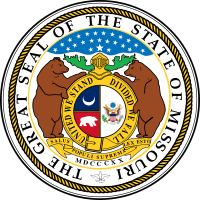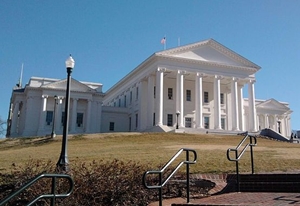December 4, 2015 •
Missouri Legislator Pre-files Ethics Reform Package
State Rep. Caleb Rowden pre-filed a four-point ethics reform package this week, hoping to increase accountability and transparency in government. The first change would prohibit gifts from lobbyists to any state or local elected officials as well as to their […]
 State Rep. Caleb Rowden pre-filed a four-point ethics reform package this week, hoping to increase accountability and transparency in government. The first change would prohibit gifts from lobbyists to any state or local elected officials as well as to their families and staff members.
State Rep. Caleb Rowden pre-filed a four-point ethics reform package this week, hoping to increase accountability and transparency in government. The first change would prohibit gifts from lobbyists to any state or local elected officials as well as to their families and staff members.
The second change would institute a revolving door provision for state legislators and statewide elected officials up for election during the presidential campaign cycle. Such individuals would be barred from lobbying for one session after leaving office beginning in 2016. Elected officials up for election during the midterm elections would be barred from lobbying for one session after leaving office beginning in 2018. After 2018, the revolving door rule would apply to all state elected officials.
A third change would prohibit individuals with open candidate committees from registering as lobbyists.
The final proposed change would require elected officials to publically disclose travel expenses paid for by a third party within 30 days of receipt or within 30 days of the trip, whichever is sooner.
Speaker of the House Todd Richardson has vowed to make ethics reform a top priority when the session begins in January.
Photo of the Missouri State Capitol by RebelAt on Wikimedia Commons.
March 27, 2015 •
Georgia Commission Meets to Consider Rule Changes
The Government Transparency and Campaign Finance Commission held a day-long meeting on March 26 to consider rule changes and to conclude ethics complaints. The proposed rule changes are to aid in the implementation of ethics reforms passed nearly two years […]
 The Government Transparency and Campaign Finance Commission held a day-long meeting on March 26 to consider rule changes and to conclude ethics complaints. The proposed rule changes are to aid in the implementation of ethics reforms passed nearly two years ago.
The Government Transparency and Campaign Finance Commission held a day-long meeting on March 26 to consider rule changes and to conclude ethics complaints. The proposed rule changes are to aid in the implementation of ethics reforms passed nearly two years ago.
The new lobbyist gift law sets a $75 limit on some gifts, exempts other gifts, and completely prohibits any gift not otherwise limited or exempted. Lobbyists, public officials, and the public still have questions about how the limits are supposed to be followed.
The commission approved a rule to regulate lobbyist gifts to family members of public officials, but tabled rules about how often a lobbyist can give a $75 gift and whether multiple lobbyists can split the cost of a gift valued at more than $75.
The commission closed about two dozen ethics complaints, with another 220 cases yet to be decided. The next commission meeting is scheduled for June 25, 2015.
Today the Phoenix, Arizona City Council is expected to vote on whether to create a city ethics commission and whether to add a gift policy to its ethics policies. According to the council’s agenda for the meeting, the proposed gift […]

Today the Phoenix, Arizona City Council is expected to vote on whether to create a city ethics commission and whether to add a gift policy to its ethics policies.
According to the council’s agenda for the meeting, the proposed gift policy identifies permissible and prohibited gifts for elected officials, employees, board members, and volunteers.
It also identifies permissible gifts to elected officials required to be disclosed on a form submitted to and posted by the city clerk.
According to AZCentral.com, the proposed ordinance would allow officials to avoid disclosing event tickets, food, drinks, transportation, or lodging they received as long as such gifts were related to economic development, tourism promotion, or a sister-cities program.
If passed, the ordinance would also create an ethics commission authorized to receive allegations of ethical violations, investigate, take testimony, and engage in any other activity in order to oversee the investigation and enforcement of the gift policy and other conflicts of interest.
The meeting is scheduled to start at 3:00 p.m.
February 11, 2014 •
South Carolina Senate Considers Overhaul of Ethics Commission
Gov. Nikki Haley has nominated eight individuals to the State Ethics Commission. If confirmed by the Senate, the appointments will bring stability to the commission, where four of the nine seats are vacant and the terms of the five serving […]

Gov. Nikki Haley has nominated eight individuals to the State Ethics Commission. If confirmed by the Senate, the appointments will bring stability to the commission, where four of the nine seats are vacant and the terms of the five serving commissioners have expired.
The Senate is also debating a bill to overhaul the commission and empower it to confidentially investigate complaints filed against House and Senate members.
House Bill 3945 would also expand the definition of lobbying and modify reporting requirements.
January 17, 2014 •
Missouri Legislators to Address Comprehensive Ethics Reform
Missouri legislators made ethics a top priority at the start of their legislative session. The Legislature convened on January 8 and members filed at least 10 bills addressing issues such as lobbyist registration, gifts to public officials, campaign contribution limits, […]

Missouri legislators made ethics a top priority at the start of their legislative session. The Legislature convened on January 8 and members filed at least 10 bills addressing issues such as lobbyist registration, gifts to public officials, campaign contribution limits, and revolving door provisions.
Although Missouri is one of few states placing no restrictions on campaign donations or lobbyist gifts, reform appears to be of bipartisan concern. Secretary of State Jason Kander announced the most comprehensive approach to ethics reform with HB1340, introduced by Rep. Kevin McManus. The proposal establishes contribution limits, closes the revolving door for legislative officials, and establishes a lobbyist gift ban.
Kander’s proposal is unique in that it also adds mandatory registration requirements for paid political consultants as well as whistle-blower incentives. Those who provide information about ethics violations could receive 10 percent of the fines collected for the violation they revealed.
The Legislature discounted opportunities in the past to address ethics reform. With momentum building, many are hoping this is the year for change.
January 7, 2014 •
Virginia Ethics Reform on the Horizon
The Virginia General Assembly may be taking steps toward substantive ethics reform in its upcoming session. Ethics bills have already been prefiled in anticipation of the session’s start on January 8, most notably Senate Bill 274, limiting gifts to officers […]
 The Virginia General Assembly may be taking steps toward substantive ethics reform in its upcoming session. Ethics bills have already been prefiled in anticipation of the session’s start on January 8, most notably Senate Bill 274, limiting gifts to officers and employees of the state and local governments to $100 per calendar year, and requiring disclosure of gifts to immediate family members.
The Virginia General Assembly may be taking steps toward substantive ethics reform in its upcoming session. Ethics bills have already been prefiled in anticipation of the session’s start on January 8, most notably Senate Bill 274, limiting gifts to officers and employees of the state and local governments to $100 per calendar year, and requiring disclosure of gifts to immediate family members.
Virginia does not currently limit the amount of gifts officials and employees may receive, and many called for reform after Gov. Bob McDonnell became embroiled in scandal after accepting thousands of dollars worth of gifts from Star Scientific CEO Jonnie Williams. Williams had also made gifts to McDonnell’s wife and daughters, prompting the addition of disclosure requirements to immediate family members.
Photo of the Virginia Capitol courtesy of Varmin on Wikimedia Commons.
August 6, 2013 •
Tuesday Lobbying and Campaign Finance News
Keep up with the latest government relations news with these articles:
 Lobbying
Lobbying
“K Street powerhouse lobbies for green energy tax bill” by Ben Geman in The Hill.
Campaign Finance
New York: “Reform advocate spends big money” by Jimmy Vielkind in the Times Union.
New York: “Citing Irregularities, City Board Rejects Public Money for Liu’s Campaign” by David W. Chen in The New York Times.
Ethics
“FEC commissioner: New emails could tie agency to IRS targeting” by Blake Neff in The Hill.
Missouri: “Creator of Missouri Ethics Commission nominated for federal bench” by Jo Mannies in the St. Louis Beacon.
New Hampshire: “Ethics committee: Special E-ZPasses don’t violate gift limits for N.H. lawmakers” by Ben Leubsdorf in the Concord Monitor.
New Jersey: “Appeals court affirms dismissal of ethics complaint against assemblyman” by Matt Friedman in the Star-Ledger.
Utah: “Panel investigating Attorney General John Swallow to hold first meeting” by John Swallow in the Deseret News.
Virginia: “Cuccinelli pushes for special session on ethics rules” by Julian Walker in The Virginian-Pilot.
Redistricting
California: “SoCal Rep. Lowenthal takes a big swing at redistricting with new bill” by Kitty Felde on KPCC News.
May 31, 2013 •
Kansas City, Missouri Council Passes Ethics Ordinance
Gifts capped at $1,000
 City Council approved changes to the ethics code setting limits on gifts to city officials and employees on Thursday, May 30, 2013. Ordinance No. 130249 prohibits an official or employee and their immediate families from knowingly accepting any gift having a value in excess of $1,000 from any person or business with a substantial interest in legislative or administrative actions.
City Council approved changes to the ethics code setting limits on gifts to city officials and employees on Thursday, May 30, 2013. Ordinance No. 130249 prohibits an official or employee and their immediate families from knowingly accepting any gift having a value in excess of $1,000 from any person or business with a substantial interest in legislative or administrative actions.
Gifts worth more than $200 must be reported quarterly by the city official or employee. Previously, reports were due annually and there was no limit on gifts.
The bill becomes effective in 10 days unless vetoed by the Mayor.
March 6, 2013 •
Florida Senate Passes Ethics Package
Bills were priorities of Senate President
 On the first day of the 2013 legislative session the Florida Senate unanimously passed ethics reform bills.
On the first day of the 2013 legislative session the Florida Senate unanimously passed ethics reform bills.
The bills add revolving door provisions, increase the responsibilities of the ethics commission, and require financial disclosure reports to be posted online.
The reform package now moves to the House, where somewhat different versions of the legislation are already under consideration.
March 1, 2013 •
Taking Matters into Their Own Hands
Georgia and Missouri
 This year’s push for ethics reform in several state legislatures could not happen fast enough for some elected officials. Georgia’s Senate and Missouri’s Secretary of State, Jason Kander, decided on day one to take matters into their own hands by adopting new gift rules for their respective offices.
This year’s push for ethics reform in several state legislatures could not happen fast enough for some elected officials. Georgia’s Senate and Missouri’s Secretary of State, Jason Kander, decided on day one to take matters into their own hands by adopting new gift rules for their respective offices.
The Georgia Senate imposed a $100 limit on gifts from lobbyists. Senators approved the gift cap on the opening day of the 2013 General Assembly session as part of new rules governing the chamber’s operations for the current two-year term. The new rule does not apply to travel costs or to gifts provided to groups of senators, including committees. The rule does allow lobbyists to give $100 gifts on multiple occasions. Meanwhile, House Speaker David Ralston has unveiled an ethics reform bill aimed at expanding the definition of a lobbyist and restricting lobbyist gifts. House Bill 142 would ban even the smallest expenditure of a lobbyist if for the benefit of a single member of the General Assembly. Lobbyists would still be permitted to spend on committees, caucuses, and expenses to public officers for trips to conferences and meetings.
Missouri Secretary of State Jason Kander, sworn in on January 14, 2013, announced a new ethics policy as part of his “Day 1 Achievements.” The new policy prohibits the staff in his office from accepting gifts from lobbyists. State administrative policy already curtails what state employees may accept from lobbyists, but agencies are free to adopt stricter guidelines. Additionally, Missouri’s House and Senate are both considering bills to curb lobbyist spending. House Bill 139 would prohibit General Assembly members, family, and staff from accepting more than $1,000 per calendar year from lobbyists. Senate Bill 181 would prohibit statewide elected officials, legislators, staff, employees, and family from accepting gifts over $50 from a lobbyist.
February 22, 2013 •
Georgia House Set to Consider on Ethics Bills
Vote expected on Monday for House Bill 142 and 143.
 Two ethics reform bills will likely be voted on by the full House on Monday, February 25, 2013. House Bill 142, sponsored by Speaker David Ralston, would ban lobbyist spending on individual lawmakers, return regulatory powers to the state ethics commission, and require activists representing an organization to register as lobbyists.
Two ethics reform bills will likely be voted on by the full House on Monday, February 25, 2013. House Bill 142, sponsored by Speaker David Ralston, would ban lobbyist spending on individual lawmakers, return regulatory powers to the state ethics commission, and require activists representing an organization to register as lobbyists.
House Bill 143, also sponsored by Ralston, would require lawmakers to file a report early in the legislative session detailing campaign contributions and expenditures during the five-day period before the Legislature convenes.
Photo of the Georgia State Capitol by Autiger on Wikipedia.
February 14, 2013 •
Chicago City Council Passes Watered-Down Ethics Ordinance
Mayor Emanuel Vows to Continue Fight
 The Chicago City Council approved phase two of Mayor Rahm Emanuel’s ethics reform. This time, however, it didn’t come easy and the mayor is not completely satisfied with its outcome. The set of reforms focused mainly on public officials.
The Chicago City Council approved phase two of Mayor Rahm Emanuel’s ethics reform. This time, however, it didn’t come easy and the mayor is not completely satisfied with its outcome. The set of reforms focused mainly on public officials.
Mayor Emanuel’s proposal included a two year ban on lobbying after leaving city council office and allowing citizens to make anonymous complaints against aldermen. The city council was against both of these provisions and eventually passed a watered-down version of the proposal.
The ban on lobbying will only last for one year and does not take effect until January 1, 2014. The idea of anonymous complaints was completely tossed out; as the aldermen were afraid the tactic would be used by political enemies to gain an advantage. Emanuel was not pleased with the changes. He vowed to continue to fight for the anonymous complaints and mentioned the aldermen are just playing into the hands of the cynics.
Following the council’s vote Emanuel said, “I believe all of you work really hard. You don’t get credit for how hard you work. You get an unfair rap. But when you take an action like you just took, it reinforces a cynicism about you.” He added, “I want you all to know that is not the end of the process. I’m going to continue to do it.”
Photo of the Daley Plaza and Chicago City Hall by JeremyA on Wikipedia.
January 28, 2013 •
South Carolina Ethics Reform Commission Offers Recommendations
Lobbying definitions and fees would expand
 The Commission on Ethics Reform, formed by Governor Nikki Haley in October, 2012, has released 23 recommendations following a series of public meetings. Recommendation 12 would revise lobbying definitions to cover individuals who lobby any political subdivision of the state, including counties, city councils, municipalities, school districts, and special purpose or public service districts.
The Commission on Ethics Reform, formed by Governor Nikki Haley in October, 2012, has released 23 recommendations following a series of public meetings. Recommendation 12 would revise lobbying definitions to cover individuals who lobby any political subdivision of the state, including counties, city councils, municipalities, school districts, and special purpose or public service districts.
The commission hopes to offset the additional cost associated with expanding lobbying registration and reporting by increasing the registration fee for lobbyists and lobbyist principals. Whether or not the reform recommendations will produce new legislation is up to state lawmakers.
November 14, 2012 •
Georgia Alliance for Ethics Reform Begins Statewide Tour
Senator Josh McKoon to pre-file legislation in December
 The Georgia Alliance for Ethics Reform is holding town hall meetings throughout the state to encourage citizen feedback on comprehensive ethics reform to be introduced in the 2013 legislative session. Senator Josh McKoon plans to pre-file ethics legislation in four separate bills by mid-December.
The Georgia Alliance for Ethics Reform is holding town hall meetings throughout the state to encourage citizen feedback on comprehensive ethics reform to be introduced in the 2013 legislative session. Senator Josh McKoon plans to pre-file ethics legislation in four separate bills by mid-December.
The legislation will include a comprehensive bill, a $100 gift limit bill, and two constitutional amendments to regulate funding for the ethics commission and to authorize a statewide grand jury to investigate corruption.
The next stop on the town hall tour will be in Columbus on November 27th.
The Georgia Alliance for Ethics Reform includes Common Cause Georgia, Georgia Conservatives in Action, Georgia Tea Party Patriots, League of Women Voters in Georgia, and Georgia Watch.
State and Federal Communications, Inc. provides research and consulting services for government relations professionals on lobbying laws, procurement lobbying laws, political contribution laws in the United States and Canada. Learn more by visiting stateandfed.com.


